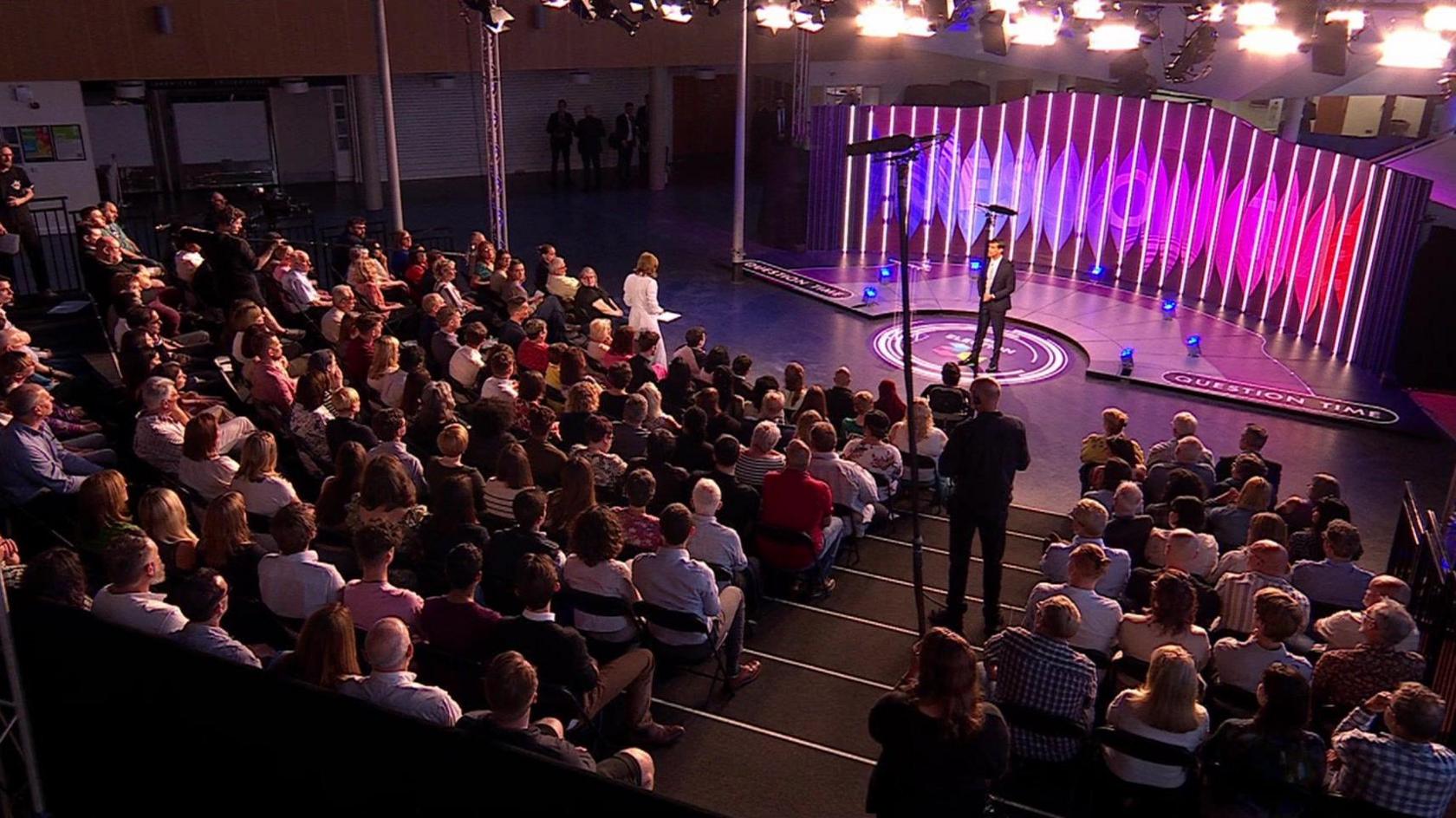Key takeaways from BBC Question Time election special

- Published
There's just two weeks to go until election day, and party leaders from the Conservatives, Labour, the Lib Dems and the SNP faced tough questions from a BBC Question Time audience in York.
Rishi Sunak, Sir Keir Starmer, Sir Ed Davey and John Swinney each had 30 minutes to make their case.
Here is what we learnt:
1. Mistakes and trust
Over two hours, the party leaders covered a range of topics, but two words kept cropping up: mistakes and trust.
Sir Ed admitted mistakes over his party’s U-turn on scrapping tuition fees as well as his handling of the Post Office scandal. Mr Swinney acknowledged his own party’s turbulent few years.
Audience members asked Sir Keir how they could trust him following changes of heart on big policy areas. And Mr Sunak was pressed on how he could restore trust after what an audience member called the “shenanigans” of his party.
2. Davey justifies ‘horseplay’
From playing in sandpits to falling off paddleboards, one audience member wondered whether Sir Ed's “horseplay” was really prime ministerial.
Another voter said his party was not going to be elected and that therefore his manifesto did not have to be realistic.
Sir Ed said politicians should take voters’ concerns seriously, but not themselves.
He argued that his campaigning style was designed to draw attention to genuine problems including mental health or sewage.
3. Lib Dems still haunted by coalition with Tories
It has been 14 years since Sir Ed’s party first teamed up with the Tories but the Lib Dems still face questions about that move – and specifically their decision to ditch a promise to scrap tuition fees once they went into government.
Sir Ed, who served as a minister in the 2010 coalition government, said it was a “scarring experience” but argued that his party doesn’t get “enough credit” for the things it stopped the Conservatives from doing.
However he acknowledged that his party “got punished” for its time in government and told voters his mission now was to “defeat as many Conservative MPs as possible”.
4. SNP leader challenged, even by an SNP supporter
Mr Swinney faced tricky questions from the audience – “how has it gone so badly wrong?” asked one.
But he was also challenged by a self-described “long-term supporter” of the SNP. That questioner wondered how the party could be trusted to lead an independent Scotland when it had “destroyed itself from the top down”.
Mr Swinney pointed to achievements including taking children out of poverty and expanding early childcare.
He avoided saying whether his party would interpret a loss of SNP MPs at the election as a sign that the Scottish people didn’t want independence.
5. Swinney steers clear of party’s legal woes
Mr Swinney was upfront about his party’s “turbulent time” but steered clear of explicitly addressing one of the main issues dogging the SNP.
He avoided any mention of the former first minister Nicola Sturgeon, who has been under investigation into the funding and finance of the SNP; and her husband Peter Murrell, who has been charged with embezzlement. Both deny wrongdoing.
6. Starmer pressed on Corbyn support
Last week, Labour leader Sir Keir attacked the Conservative manifesto – describing it as a “Jeremy Corbyn-style manifesto”.
So why did Sir Keir back Mr Corbyn in the 2019 general election? asked an audience member.
Sir Keir said he campaigned for Labour in 2019 because he wanted to see “good colleagues” back in Parliament, and the defeat taught him valuable lessons.
Fiona Bruce came back to him repeatedly, asking whether he had meant it when, in 2019 he said Jeremy Corbyn would be a “great prime minister”.
The Labour leader didn’t directly answer the question, instead stressing that he had been backing his party.
He finally added he thought Mr Corbyn would have been a better PM than Boris Johnson.
7. Starmer pledges to end landlord bidding wars
Asked about high rents, Sir Keir said he wanted to stop landlords playing potential tenants against each other in a bid to push up rent.
He said it wasn’t fair on people and promised to pass legislation to stop the practice.
But he was hazy when asked for details about how a new scheme would work.
8. Embarrassment?
The first question Mr Sunak faced was a brutal one. “Do you feel any embarrassment to be leading the Conservatives?” asked an audience member to applause from those around him.
Mr Sunak sought to stress differences between himself and his predecessors. He said “mistakes had been made”, adding that he had argued vigorously against the policies of Liz Truss.
He urged voters to judge him “on my 18 months”.
9. National service sanctions?
The Conservative leader enthusiastically defended his plan to re-introduce national service for young people, arguing it could transform lives.
Asked how young people would be compelled to do it, the PM said there would be sanctions but avoided being explicit.
He said European countries tried "all sorts of things" including driving licences and “access to finance”, but he didn’t commit to anything, saying instead he would set up a Royal Commission to consider the details.
10. Irritable exchanges over European Court of Human Rights
For the final question, an audience member asked if Mr Sunak would consider leaving the European Court of Human Rights in order to achieve his plans to send people to Rwanda.
The prime minister said he would if he felt the court was undermining national security.
That statement elicited applause but also shouts of “shame” from the audience.
